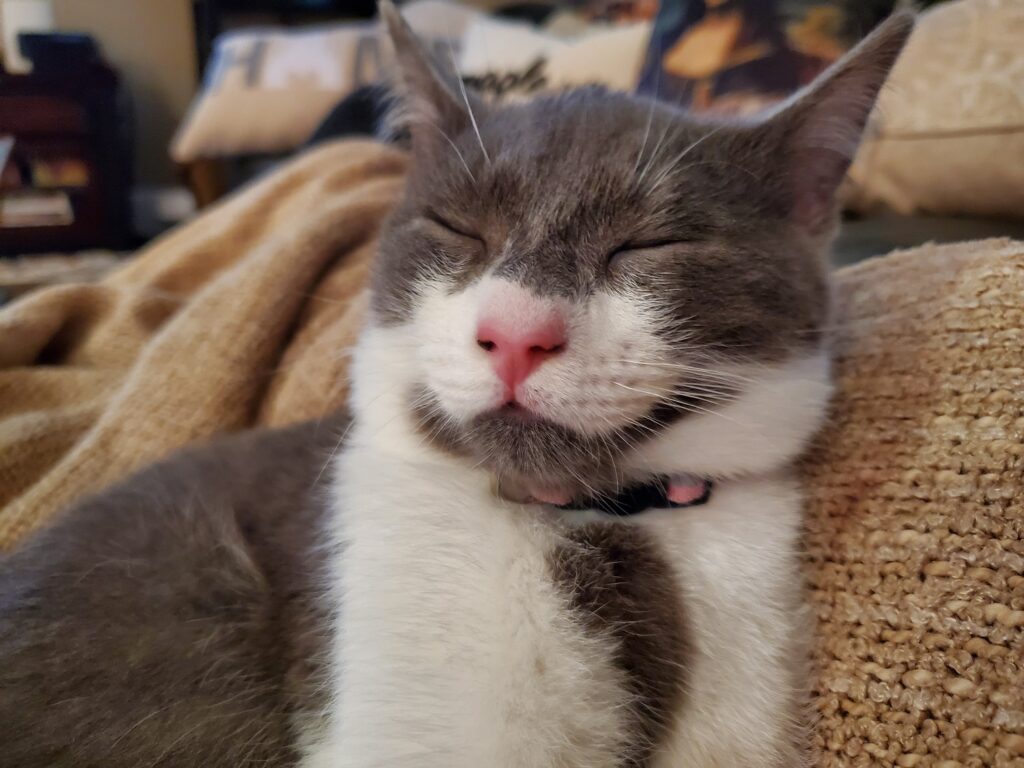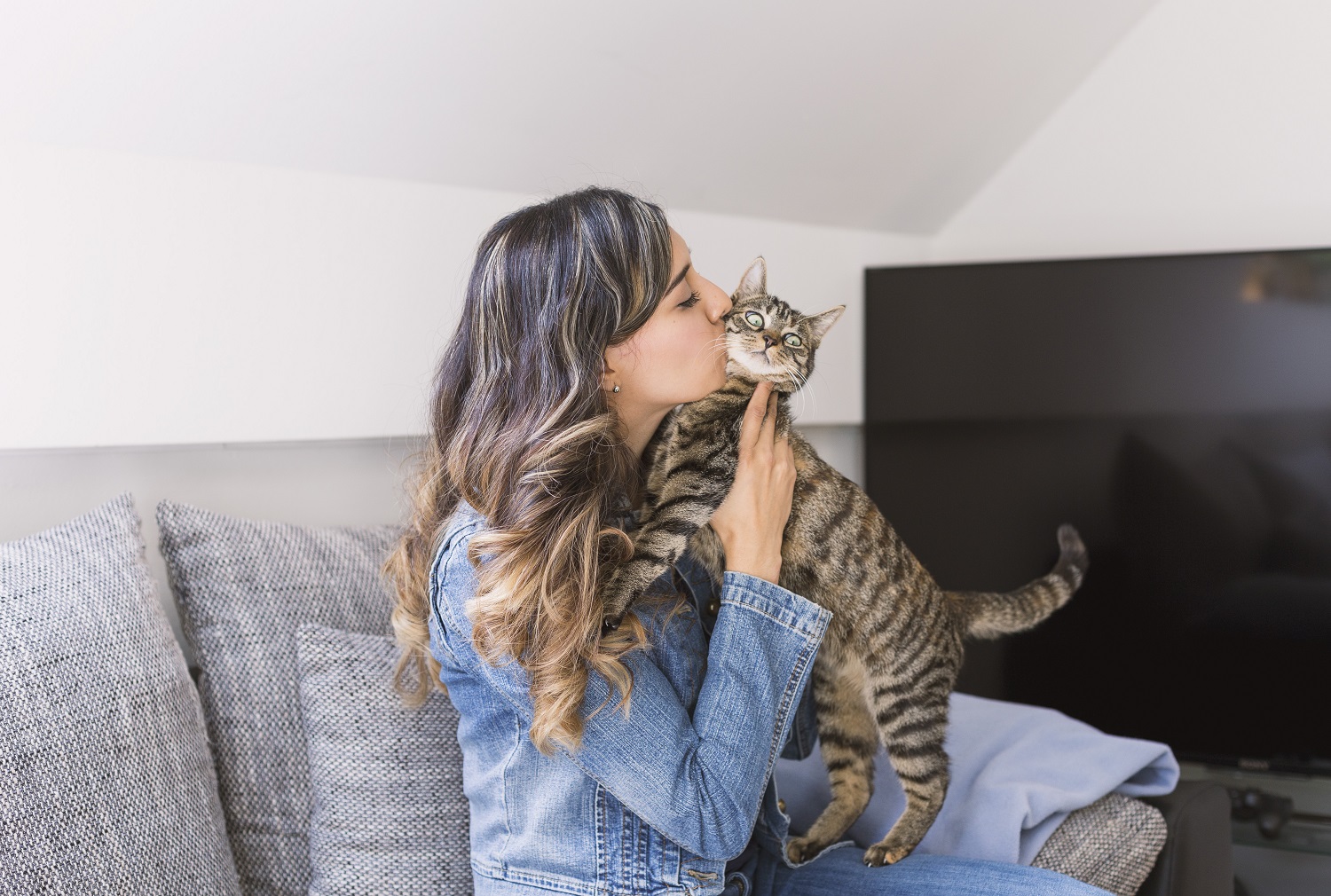You lean in to give your cat a gentle kiss on the head, and they blink slowly or give you a calm stare in return. You take that as a win. But does your cat actually understand what your kiss means?
While cats do not experience affection in exactly the same way humans do, many cats recognize kisses as a form of attention and affection. They may not know it as a gesture of love the way people do, but they absolutely pick up on the tone, energy, and intention behind it.
Let’s look at how cats interpret human affection, how to tell if your cat enjoys being kissed, and the best ways to show love in a way your cat actually understands.
Cats Do Not Naturally Kiss, but They Understand Affection
In the feline world, physical affection looks a little different. Cats groom each other, rub heads, touch noses, and engage in slow blinking. Kissing, as humans do it, is not part of their social toolkit.
Still, domestic cats are incredibly perceptive. Over time, they learn to recognize and respond to the behavior of the people they live with. When you consistently offer kisses during calm, affectionate moments, your cat begins to associate the gesture with safety, love, and connection.
It is not about the kiss itself. It is about the energy behind it.
How Cats Interpret Human Behavior
Cats are masters at reading body language, tone of voice, and routine. They may not understand your words, but they know when you are being kind, playful, or upset.
When you kiss your cat, you are combining multiple social cues:
- A soft tone of voice
- Gentle eye contact
- Calm body language
- Physical closeness
To your cat, this may feel a lot like grooming or bonding. Even if they do not “get” the kiss, they often understand that it is a positive interaction.
If your cat enjoys the moment, you will usually see subtle signs of trust, like:
- Slow blinking
- Purring or head butting
- Leaning into your touch
- A relaxed body or soft tail flick
Some Cats Like Kisses, and Some Do Not
Just like people, cats have personal boundaries. While some cats love physical affection and lean in for attention, others may prefer to keep their space.
Your cat’s personality, history, and socialization will all shape how they respond to being kissed.
Affectionate cats might:
- Lift their head or move closer
- Purr or blink slowly
- Nuzzle or gently head butt you in return
More reserved cats might:
- Flatten their ears
- Pull away or stiffen
- Twitch their tail or give you a look of mild judgment
Neither reaction is “bad.” It just means your cat has preferences. Pay attention to their signals and respect their comfort zone.
Better Ways to Show Love to Your Cat
Even if your cat is not a fan of kisses, there are plenty of other ways to show love in a language they understand.
1. Slow blinking
Cats use slow blinking to signal trust and affection. Try catching your cat’s gaze and blinking slowly at them. If they return the gesture, it is their version of “I love you too.”
2. Gentle head rubs
Most cats enjoy soft scratches around the cheeks, chin, and base of the ears. Let your cat come to you and guide the interaction.
3. Grooming with a brush
Brushing mimics the grooming behavior cats use to bond. Regular brushing sessions can become a soothing ritual for both of you.
4. Playtime and engagement
Interactive toys and focused play sessions show your cat that you enjoy spending time with them. Play builds trust and keeps them mentally stimulated.
5. Providing comfort and routine
Cats feel loved when their environment is calm and predictable. Regular feeding times, quiet nap zones, and consistent attention go a long way in helping them feel secure.

Of course you want to love on me. How could you not? I mean, look at me! I’m freaking adorable. #SexyKitty #SoSoftAndFluffy #YouKnowYouWantToKissMe
Joey
Signs Your Cat Feels Loved
You may wonder if all your affection is getting through. The answer is yes, often more than you think.
Here are a few signs your cat feels connected to you:
- They choose to nap near you or in your lap
- They follow you from room to room
- They bring you toys or “gifts”
- They show their belly or stretch out around you
- They meow softly or chirp when you talk to them
- They initiate contact through head bumps or purring
Even cats who are not big on physical touch can show affection in quiet, consistent ways. The key is learning to recognize and appreciate their unique love language.
Final Thoughts: Cats Love in a Language All Their Own
Kissing your cat might not mean to them what it means to you, but that does not make it meaningless. Cats recognize affection through tone, touch, and presence, even if they are not fluent in human gestures.
If your cat leans into your kisses or blinks slowly in response, you can be pretty sure they feel the love. If they prefer other forms of affection, that is fine too. Every cat is different, and part of the joy of cat parenting is learning how your feline prefers to give and receive attention.
At the end of the day, whether it is a kiss, a brush, or a game of chase-the-feather, your cat knows when they are cared for. And if they show you their belly or bring you a toy mouse at 3 a.m., consider that the highest form of feline praise.
Sources:
How Cats Show Affection https://www.humanesociety.org/resources/how-cats-show-love
Understanding Cat Body Language https://www.icatcare.org/advice/cat-communication-and-body-language
Feline Social Behavior https://vcahospitals.com/know-your-pet/social-behavior-of-cats
Can Cats Feel Love? https://www.petmd.com/cat/behavior/can-cats-feel-love
Recent Posts
Your Cat Might Be a Furry Little Healer… or at Least a Fuzzy Alarm System If you’ve ever had your cat suddenly become extra clingy when you’re under the weather, you’re not alone. From...
Cats are experts at hiding things, socks under furniture, their disdain for your playlist, and, unfortunately, symptoms of illness. In the wild, showing weakness could make them a target, so even...


